ZEN IRODALOM ZEN LITERATURE
« Zen főoldal
« vissza a Terebess Online nyitólapjára
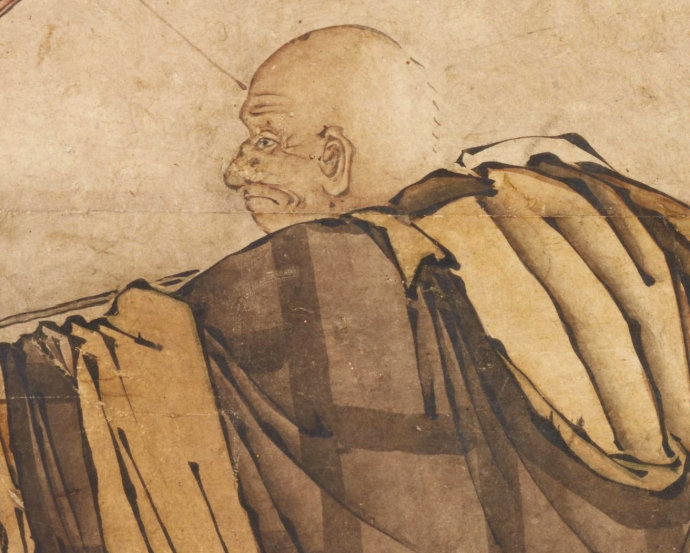
石鞏慧藏 Shigong Huizang (n. d.)
(Rōmaji:) Sekkyō/Shakkyō Ezō
(Hangul & RR Transliteration:) 석공 혜장 Seokgong Hyejang
(Magyar:) Si-kung Huj-cang
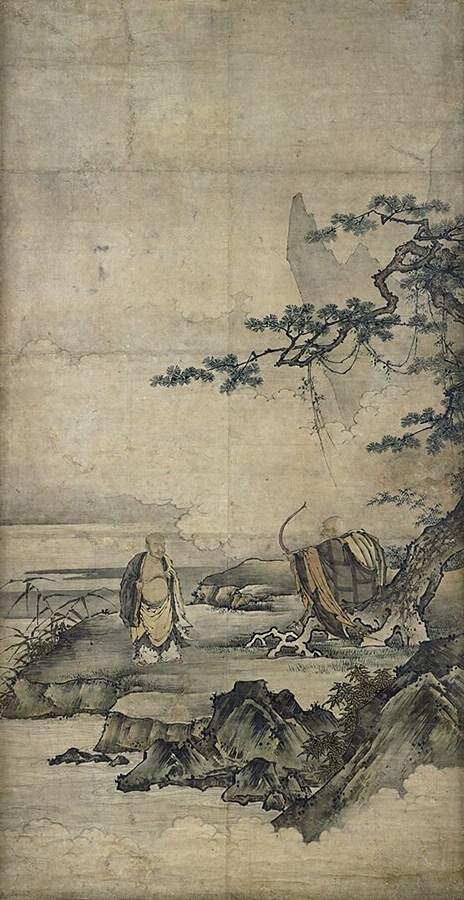
Sanpei kaikyō 三平開胸
Painting by Kanō Motonobu 狩野元信 (1476-1559) in the Daisen'in 大仙院 of Daitokuji 大徳寺 (ca. 1513, Kyoto)
Ch: Sanping kaixiong. Lit. Sanpei baring his chest. Also Sanpei Sekkyō 三平石鞏 and Sekkyō chōkyū
石鞏張弓 (lit. Sekkyō stretching his bow). The Tang dynasty painting theme of priest Sanpei's 三平 (Ch: Sanping) first visit to the priest Sekkyō 石鞏 (Ch: Shigong). Typically when called upon by another priest, Sekkyō would fit an arrow in to his bow, draw the bow string taut, and aim at his visitor as a test. Sanpei, however, boldly responded to Sekkyō's challenge by uncovering his chest. This unconventional reaction deeply impressed Sekkyō, and by some accounts he reached enlightenment at that instant.
Sanping Yizhong 三平義忠 (781-872) (Jingde chuandenglu T. 2076, 248b11-c26):
Chan master Sanping Yizhong of Zhangzhou was a native of Fuzhou. His family name was Yang. He first studied with Shigong. Shigong always awaited students with a fully drawn bow and arrow. Master [Sanping] pointed at the dharma chair. Shigong said: “Look at this arrow!” Sanping bared his chest and said: “This is an arrow to kill a man. What about an arrow to enliven a man? Shigong snapped the string of his bow three times. Sanping prostrated. Shigong said: “Thirty years, one drawn bow and a pair of arrows: thankfully I now got myself half a sage.” Then he broke his bow and arrows.
漳州三平義忠禪師福州人也。姓楊氏。初參石鞏。 石鞏常張弓架箭以待學徒。 師詣法席。鞏曰。看箭。師乃撥開胸云。此是殺人箭。活人箭又作麼生。鞏乃扣弓絃三下。師便作禮。鞏云。三十年一張弓兩隻箭。只謝得半箇聖人。遂拗折弓箭。Master Sanping Yizhong (781-872) was a disciple of Master Dadian Baotong who taught in Shaozhou in the far south (near Caoxi). Master Dadian had been one of the prominent students of Master Shitou.
After training with Master Dadian, the young Yizhong traveled to refine himself among many teachers. Once he visited Master Shigong Huizang, the disciple of Mazu who had been a hunter before becoming a monk. Master Shigong had a fierce reputation and was known to greet his visitors by aiming a bow and arrow at them. When Yizhong arrived before the master, he was greeted in this way. As the master drew back his arrow, Yizhong opened his robe, bared his chest, and said, “This arrow is for killing. What arrow gives life?”
Shigong lowered the bow and arrow. Yizhong made prostrations. Master Shigong then said, “After thirty years I've finally met half a sage.” Then he broke his bow.
Yizhong eventually settled down to teach at Triple Peace (Sanping) Mountain in Zhangzhou (in modern Fujian Province). Once he said to his community, “Just this very seeing and hearing goes beyond 'seeing and hearing', and there are no other sounds or forms to offer you. If you realize this right here, then nothing will be the matter.”
SHIH-KUNG AND SAN-PING
Translated by D. T. Suzuki
In: Essays in Zen Buddhism: Second Series (1933), New York: Samuel Weiser, Inc.
1953. Edited by Christmas Humphreys. p. 81.
Shih-kung was a hunter before he was ordained as a Zen monk under Ma-tsu. He disliked very much Buddhist monks who were against his profession. One day while chasing a deer he passed by the cottage where Ma-tsu resided. Ma-tsu came out and greeted him. Shih-kung the hunter asked, "Did you see some deer pass by your door?"
"Who are you?" asked the master.
"I am a hunter."
"Do you know how to shoot?"
"Yes, I do."
"How many can you shoot down with one arrow?"
"One with one arrow."
"Then you do not understand how to shoot," declared Ma-tsu.
"You know how to shoot?" asked the hunter.
"Yes, most certainly."
"How many can you shoot down with one arrow?"
"I can shoot down the entire flock with one arrow."
"They are all living creatures; why should you destroy the whole flock at one shooting?"
"If you know that much, why don't you shoot yourself?"
"As to shooting myself, I do not know how to proceed."
"This fellow," exclaimed Ma-tsu, all of a sudden, "has put a stop today to all his past ignorance and evil passions!"
Thereupon, Shih-kung the hunter broke his bow and arrows and became Ma-tsu's pupil.When he became a Zen master himself, he had a bow with an arrow ready to shoot, with which his monks were threatened when they approached him with a question. San-ping was one so treated.
Shih-kung claimed, "Look out for the arrow!"
Ping opened his chest and said, "This is the arrow that kills; where is the one that resuscitates?"
Kung struck three times on the bow-string; Ping made a bow.
Said Kung, "I have been using one bow and two arrows for the past thirty years, and today I have succeeded in shooting down only a half of a wise man."
Shih-kung broke his bow and arrows once more, and never used them again.[Chuan-têng Lu, VI and XIV.]
Chan Master Fuzhou Shigong Huizang
Chan master Huizang of Shigong in Fuzhou originally took up hunting as a profession and had a bad opinion of monks. On account of following a herd of deer one day, he passed by Mazu’s hermitage. Mazu engaged him. Zang asked, ‘Has the venerable monk seen a herd of deer passing by or not?’
‘Who are you?’ replied Mazu.
‘I am a hunter,’ said Zang.
‘Do you know how to shoot then?’ asked Mazu.
‘I know how to shoot,’ replied Zang.
‘How many can you shoot with one arrow?’ said Mazu.
‘One with one arrow,’ replied Zang.
‘You don’t know how to shoot,’ said the Patriarch [Mazu].
‘Does the venerable monk know how to shoot then?’ countered Zang.
‘I know how to shoot,’ said Mazu.
‘How many can the venerable monk shoot with one arrow then?’ asked Zang.
‘A whole herd with one arrow,’ replied the Patriarch.
‘They are all living things – what is the use of shooting the whole herd?’ said Zang.
‘If you know this why not shoot yourself?’ asked the Patriarch.
‘If I were taught how to shoot myself there would suddenly be nothing in my hands,’ said Zang.
‘This fellow! After many kalpas of ignorance and vexation, today is the day of their final cessation,’ said the Patriarch.
Then Zang destroyed his bow and arrows, himself cut off his hair with a knife and handed himself over to the Patriarch and the homeless life.
One day whilst Zang was working in the monastery kitchen, the Patriarch asked, ‘What are you doing?’
‘Tending the ox,’ replied Zang.
‘How is the tending going?’ asked the Patriarch.
‘When he gets overexcited in the pastures I grab him by the nose and pull him back,’ said Zang.
‘You are really tending the ox!’ said the Patriarch.
The master fell silent. Later, when the master had his own monastery, he often had occasion to use the bow and arrow [story].
The master asked Xitang,* ‘Do you truly know how to seize hold of emptiness?’
*Zhizang Xitang (735-814 CE) was one of the senior disciples of Mazu.
‘Seize,’ replied Xitang.
‘How to seize?’ persisted the master.
Xitang gathered the air with his hands.
‘What kind of a way is that to seize emptiness?’ said the master and grabbed Xitang by the nose. Xitang cried out in pain, saying, ‘Brutally seizing a man’s nose – it’s almost off!’
‘Just this is the way to seize hold of emptiness,’ said the master.
When monks came for interviews the master would ask, ‘Where is the one who has just arrived going to?’
One monk answered, ‘Here.’
‘Where is here?’ asked the master.
The monk snapped his fingers.
A monk came and bowed courteously. The master said, ‘Did you also bring that one along or not?’
‘Brought it,’ said the monk.
‘Where is it?’ asked the master.
The monk snapped his fingers three times.
Someone asked, ‘How to get out of life and death?’
‘What to do after getting out?’ countered the master.
‘How to escape?’ insisted the monk.
‘There is no birth and death here,’ said the master.
Ch'an Master Hui Ts'ang of Shih Kung
In: Ch'an and Zen Teaching, Series One
by Lu K'uan Yü (Charles Luk)
Rider & Co., London, 1960, pp. 136-138.
Translated from The Imperial Selection of Ch'an Sayings (Yu Hsuan Yu Lu)
[Yuxuan yulu 御選語錄 (Imperial Selections of Recorded Sayings / Emperor's Selection of Quotations)]
THE master was formerly a hunter by profession and disliked the sight of
Buddhist monks. (One day), while chasing deer, he passed before the
temple where Ma Tsu stayed. As the latter (who was at the door) greeted
him, he asked Ma Tsu: 'Have you seen any deer pass by?' Ma Tsu asked
back: 'Who are you?' The master replied: 'I am a hunter.' Ma Tsu
asked: 'Do you know how to shoot?' He replied: 'Yes, I do.' Ma
Tsu asked: 'How many deer can you shoot with one arrow?' He replied:
'I can shoot one animal with an arrow.' Ma Tsu said: '(Then) you do not
know how to shoot.' He asked Ma Tsu: 'Does the Venerable Sir know
how to shoot?' Ma Tsu replied: 'Yes, I do.' He asked: 'How many
animals can you shoot with one arrow?' Ma Tsu replied: 'I can shoot
the whole herd with one arrow.' He said: 'They possess life, why do
you shoot the whole herd?' Ma Tsu asked: 'If you know this, why do
not you shoot yourself?' The master replied: 'If you want me to shoot
myself, I really do not know how to do it.' Ma Tsu said: 'The whole
aeon of this fellow's troubles (klesa) caused by ignorance is now dissipating.'
Thereupon, the master threw away his bow (and arrows) and
followed Ma Tsu to become a monk.One day, as the master was working in the kitchen, Ma Tsu asked him:
'What are you doing?' The master replied: 'I am tending an ox.' Ma
Tsu asked: 'How do you tend it?' The master replied: 'As soon as it goes
back to grass, I drag and pull it back by its nostrils.' Ma Tsu said: 'You
are really tending an ox.' Thereupon, the master stopped talking and
withdrew.After he had become abbot, Hui Ts'ang used (to hold) his bow and
arrows when receiving students of various potentialities. One day, he
asked a guest monk: 'Do you know how to catch the void?' The monk
replied: 'Yes, I do.' The master asked: 'How do you catch it?' The monk
then (tried to) catch the air with his hand. The master said: 'You really
do not know how to catch the void.' The monk asked the master: 'How
does the venerable Dharma brother catch it?' Thereupon, the master
grasped the monk's nose and pulled it with force, and the guest cried with
pain, saying: 'You pull my nose as if you want to tear it off.' The master
said: 'To see successfully, the void should be caught in this manner.'(The following is omitted in 'The Imperial Selection of Ch'an Sayings'
and quoted from 'The Transmission of the Lamp'.)One day, as the monks gathered in the hall, Hui Ts'ang asked them:
'Where did you go just now?' One of the monks replied: 'I was here.'
The master asked him: 'Where are you?' The monk made a sound by
snapping his fingers once.Another day, a monk came to pay reverence to the master who asked
the visitor: 'Do you also bring that one along with you?' The visitor
replied: 'Yes, I do.' The master asked: 'Where is it?' The visitor made
three sounds with three finger-snaps. When asked: 'How can one escape
from birth and death?' The master replied: 'What is the use of escaping?'
The questioner insisted: 'How can one succeed in escaping from them?'
The master replied: 'That one does not have birth and death.'Ma Tsu, or Ancestor Horse, was a famous Ch'an master whose coming
was predicted by the Sixth Patriarch when he said to Huai Jang: 'The
twenty-seventh Patriarch Prajnatara predicted that a colt would rush out
from under your feet, trampling on and killing people all over the world.
The answer will be found in your mind but do not talk about it too soon.'
(See The Sutra of the Sixth Patriarch, Chapter VII.) Huai Jang was
Dharma successor of Hui Neng and teacher of Ma Tsu whose successor
was Pai Chang. Pai Chang's first and second successors were Kuei Shan
and Huang Po. Ma Tsu was, therefore, the ancestor of both the Kuei
Yang (Ikyo Zen) and Lin Chi Sects (Rinzai Zen).
Ma Tsu knew that the time was ripe to liberate the hunter monk and
purposely waited for his arrival at the door of the temple. In spite of his
previous hatred of Buddhist monks, the hunter joined the order after his
interesting conversation with Ma Tsu who had managed skilfully to
develop the caller's potentiality hitherto concealed by his love of hunting.
An ox symbolizes the stubborn mind which is always prone to wander
outside in quest of external objects, symbolized by the grass. To pull back
the ox by its nose is to subdue the mind so that it can return to the self-
natured stillness. Ma Tsu praised Hui Ts'ang for his correct way of taming
the wandering mind. When the absolute has been reached, it cannot
be spoken of any further. Therefore, the master stopped the chat and
withdrew to reveal the return of all mental activities to the immutable.
The bow and arrows were used by the master who would hold them,
up or hang them on the wall to reveal the function of that which did so.
To catch the void is to reveal the absolute voidness, or Dharma-kaya.
The master wanted to take advantage of the moment to enlighten the
guest monk by posing the question. The monk was deluded and thought
of the air which was only the relative void but not the absolute. The
master's act of grasping and pulling the monk's nose revealed the absolute
Dharma-kaya which actually did it. Likewise, the monk's cry of pain
also revealed that which uttered it, although he did not notice it.
The master asked the monks: 'Where did you go just now?' to see
if they understood that the Dharma-kaya was beyond corning and going.
The monk's reply: 'I was always here' was correct for his self-nature was
omnipresent, and to reveal its presence, he snapped his fingers once to
make a sound, the act of snapping being its function and the sound
meaning all things returnable to the One Mind.
In special meetings, Ch'an masters never used specific names lest they
should give rise to grasping and attachment by their disciples. 'That One'
here is a Ch'an term meaning the One Mind. 'Do you bring that one along
with you?' means: 'Do you also bring your mind along with you?'
In other words, are you straying from your mind? If you do so, you will
never realize it. The three sounds made by snapping the fingers thrice
mean the threefold body (Trikaya) in one. Since the self-nature is beyond
creation and annihilation, why should one think of escaping from birth
and death which are illusory transformations having no real nature of
their own?
Shih-kung Hui-ts'ang
In: The Golden Age of Zen
by John C. H. Wu
Taipei : The National War College in co-operation with The Committee on the Compilation of the Chinese Library, 1967, pp. 101-102.
How resourceful Ma-tsu was in the use of upaya or expedient means finds an illustration in his conversion of Shih-kung Hui-ts'ang, who was originally a hunter loathing the very sight of Buddhist monks. On a certain day, as he was chasing after a deer, he passed by Ma-tsu's monastery. Ma-tsu came forward to meet him. Shih-kung asked him whether he had seen the deer pass by. Matsu asked, “Who are you?” “A hunter,” he replied. “Do you know how to shoot?” “Of course, I do.” “How many, can you hit by one arrow?” “One arrow can only shoot down one deer.” “In that case, you really don't know how to shoot.” “Does Your Reverence know how to shoot?” “Of course I do.” “How many can you kill with one arrow?” “I can kill a whole flock with a single arrow.” At this, Shih-kung spoke up, “After all, the beasts have life as you do, why should you shoot down a whole flock?” Ma-tsu said, “Since you know this so well, why don't you shoot yourself?” Shih-kung answered, “Even if I wanted to shoot myself, I would not know how to manage it.” At this point, Matsu remarked, “This fellow has accumulated klesha from ignorance for numberless aeons. Today the whole process has come to a sudden stop.” Tossing his arrows and bows to the ground, Shih-kung became a monk and a disciple of Ma-tsu.
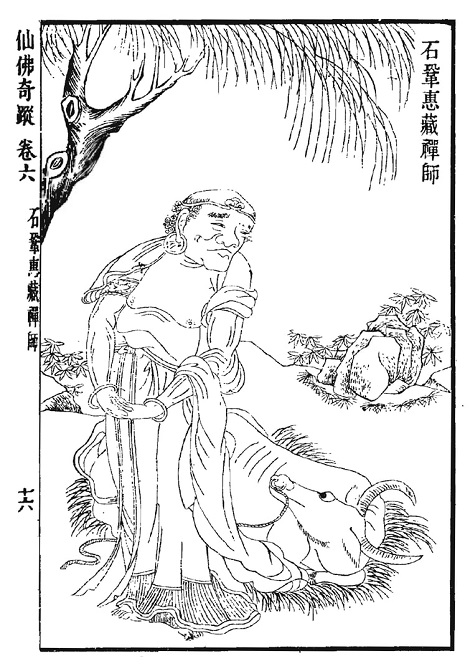
Once as Shih-kung was working in the kitchen, Ma-tsu asked him what he was doing. “I am tending an ox,” the disciple answered, meaning that he was trying to tame himself. “How do you tend it?” asked Ma-tsu. Shih-kung replied, “As soon as it goes back to the grass, I ruthlessly pull it back by its nostrils.” This won a hearty approval from the master, who remarked, “You certainly know the true way of tending an ox!” With all their jolly actions and humorous speeches, one can hardly guess with what ruthlessness and fierce energy the holy monks have controlled and disciplined their unruly natures.
From the 《古佛畫譜》 Sketchbook by 黃澤 Huangze (1924):
石鞏惠藏禪師(一) 柳葉描
石鞏惠藏禪師(二) 鐵線描
The Record of Ma-tsu - Dialogues
In:
Sun Face Buddha: The Teachings of Ma-Tsu and the Hung-chou School of Ch'an
Translated by Cheng Chien Bhikshu [Mario Poceski]
Asian Humanities Press, Berkeley, 1992, pp. 71-72.
Ch'an Master Hui-tsang of Shih-kung used to be a hunter [before becoming a monk]. He disliked monks. One day, as he was chasing a herd of deer, he happened to pass in front of the Patriarch's hermitage. The Patriarch greeted him. Hui-tsang asked, "Has the Venerable seen a herd of deer passing nearby?"
The Patriarch asked him, "Who are you?"
Hui-tsang replied, "I am a hunter."
The Patriarch asked, "Do you know how to shoot?"
Hui-tsang said, "Yes, I know."
The Patriarch asked, "How many deer can you shoot with a single arrow?"
Hui-tsang said, "With a single arrow I can shoot only one [deer]."
The Patriarch said, "You don't know how to shoot."
Then Hui-tsang asked, "Does the Venerable know how to shoot?"
The Patriarch said, "Yes, I know."
Hui-tsang asked, "How many can the Venerable shoot with a single arrow?"
The Patriarch said, "With a single arrow I can shoot the whole herd."
Hui-tsang said, "They also have life; why shoot the whole herd?"
The Patriarch said, "If you know that, then why don't you shoot yourself?"
Hui-tsang replied, "If you ask me to shoot myself, I cannot do that."
The Patriarch said, "Ah, this man. All his ignorance and defilements accumulated over vast kalpas have today suddenly come to an end." At that point Hui-tsang destroyed his bow and arrows. He cut off his hair with a knife, and became a monk with the Patriarch.
One day, as Hui-tsang was working in the kitchen, the Patriarch asked him, "What are you doing?"
Hui-tsang replied, "I am tending an ox."
The Patriarch asked, "How do you tend an ox?"
Hui-tsang replied, "When he wants to enter the grass, I grab his nostrils and pull him away."
"You are really tending an ox." commented the Patriarch.
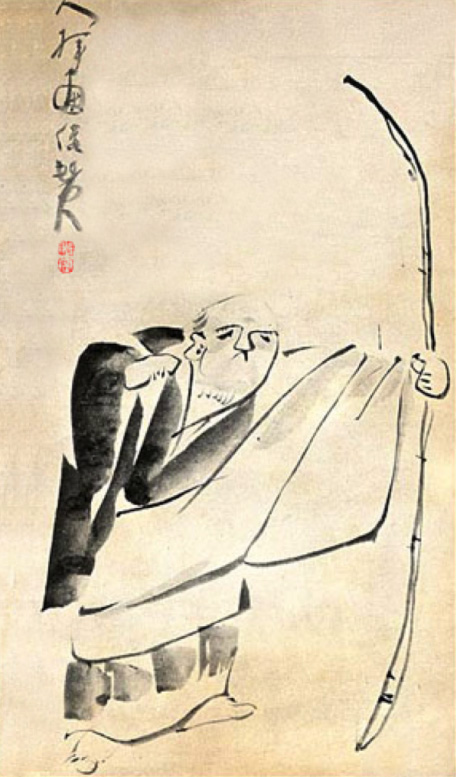
"Shigong and the Bow" by 仙厓義梵 Sengai Gibon (1750-1837)
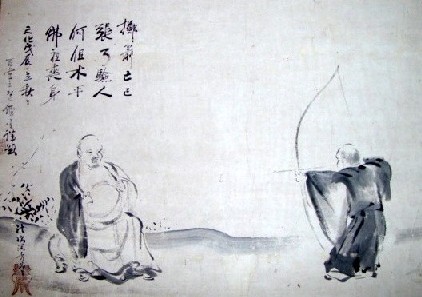
"Shigong and the Bow"
毎月の「今月の禅語」と「ミニ説教・
心の紋様」の更新をようやく終えた。表紙は、承福寺所蔵の古画。
黒田藩御用画家洞秀の画。賛は博多聖福寺・幻住庵の仙崖和尚。
禅録・碧眼録の石鞏看箭の考案をモチーフにした禅画。
The True Dharma Eye: Dogen's 300 Koans
Shigong's Emptiness (Case 248)
Translated by Kazuaki Tanahashi & John Daido Loori
http://www.reddit.com/r/Koans/comments/18fzf9/shigongs_emptiness_248_of_300/
Main Case:
Master Shigong Huizang asked Zhigong, a former abbot, "Do you know how to grasp emptiness?" 1
Zhigong said, "Yes, I know how to grasp emptiness." 2
Shigong said, "How do you grasp it?" 3
Zhigong grasped at the air with his hand. 4
Shigong said, "You don't know how to grasp at emptiness." 5
Zhigong responded, "How do you grasp it, elder brother?" 6
Shigong poked his finger in Zhigong's nostril and yanked his nose. 7
Zhigong grunted in pain and said, "It hurts! You are pulling off my nose." 8
Shigong said, "This is how to grasp it." 9
Commentary:
Zhigong's potential is stuck in a fixed position, so Master Shigong is compelled to shake him loose. If you want to free what is stuck and loosen what is bound, you must simply cut away all traces of thought, let go of all words and ideas, and experience it directly. This whole great earth is contained in a single speck of dust. When a single flower blooms, the ten thousand things come into being.
Although in yanking Zhigong's nose, Shigong was able to hide in his nostrils, we should understand that the truth of this koan is not to be found in the nose or the finger. What is the truth of this koan? Indeed, what does it mean that Shigong was able to hide in Zhigong's nostrils?
Capping Verse:
From within a single a body,
myriad forms arise.
In one, there are many kinds;
in many kinds, there is no duality.Notes:
- Shaking the tree, he wants to see what falls out.
- The tree leaned and fell over.
- It wouldn't do to let him go on like this.
- Oops! Them bones, them bones, them dry bones.
- He can only call it as he sees it.
- After all, at this point he must ask.
- Very intimate, very intimate indeed.
- It fills the universe. There is no place it does not reach.
- His eyebrows have fallen off. Too bad.
Here is the version recorded in Dōgen's shinji Shōbōgenzō (D.5:256, no. 248):
Translated by Soto Zen Text Project撫州石鞏慧藏禪師〈嗣馬祖〉問西堂、汝還解捉得虚空麼。西堂曰、解捉得。師曰、汝作麼生捉。西堂以手撮虚空。師曰、儞不解捉虚空。西堂云、師兄作麼生捉。師把西堂鼻孔拽。西堂作忍痛聲云、大殺人、拽人鼻孔、直得脱去。師曰、直得恁麼把捉始得。
The Chan Master Shigong Huizang of Fuzhou (descended from Mazu) asked Xitang, “Can you take a pinch of empty space?”
Xitang said, “I can.”
The master said, “How do you do it?”
Xitang pinched space with his fingers.
The master said, “You can't pinch space.”
Xitang said, “How does the master do it?”
The master pinched Xitang's nose and pulled it.
Xitang gave a cry of pain and said, “Murderer! Pinching someone's nose, you could pull it off.”
The master said, “You have to pinch it like this.”
Encounter Dialogues of Shigong Huizang
compiled by Satyavayu of Touching Earth Sangha
DOC: Treasury of the Forest of Ancestors
One day a hunter, who disliked monks, passed by Master Ma's hermitage as he was chasing a herd of deer. The master greeted him. The hunter asked, “Has the Venerable seen a herd of deer passing by?
The master asked, “Who are you?”
“I'm a hunter.”
“Do you know how to shoot?”
“Yes, I know.”
“How many deer can you shoot with a single arrow?”
“With a single arrow I can shoot only one.”
“You don't know how to shoot.”
“Does the Venerable know how to shoot?”
“Yes, I know.”
“How many can the Venerable shoot with a single arrow?”
“With a single arrow I can shoot the whole herd.”
The hunter paused and then said, “They all possess life; why shoot the whole herd?”
The master said, “If you know that, then why don't you shoot yourself?”
After another pause the hunter replied, “You ask me to shoot myself... I can't do that.”
The master said, “Ah, this person. All his ignorance and defilements accumulated over vast ages have today suddenly come to an end.” At that point the hunter set down his bow and arrows and cut off his hair with a knife. He was ordained as the monk Huizang with Master Ma, and went to work in the monastery kitchen. Eventually he became a teacher at Mt. Shigong.
![]()
A vadász
In: Zen történetek. Ford., szerk. és vál. Szigeti György, [Budapest] : Farkas Lőrinc Imre Kiadó, 1996, 23. oldal
Egy napon Huj-cang szarvasra vadászott. Miközben elhaladt Ma-cu temploma előtt, megállt, hogy tiszteletét tegye a kapuban álló mesternél.
- Látott erre felé szarvast? - kérdezte a mestert.
- Ki vagy te? - kérdezte Ma-cu.
- Én vadász vagyok.
- Tudod, hogyan kell lőni?
- Persze.
- Hány szarvast tudsz lelőni egy nyílvesszővel?
- Egyetlen egyet.
- Akkor te nem tudod, hogyan kell lőni!
- Mester, maga tudja?
- Én az egész csordát lelövöm egyetlen nyílvesszővel.
- Mindegyikben van élet, miért lőné le az egész csordát?
- Ha ezt tudod, akkor miért nem lövöd le magad?
- Ha azt kérné, hogy lőjem le magam, igazán nem tudnám, hogyan tegyem meg.
- Lám, ennek a fickónak most minden fájdalma szertefoszlott - mondta Ma-cu.
Erre Huj-cang eldobta az íját és Ma-cu tanítványa lett.